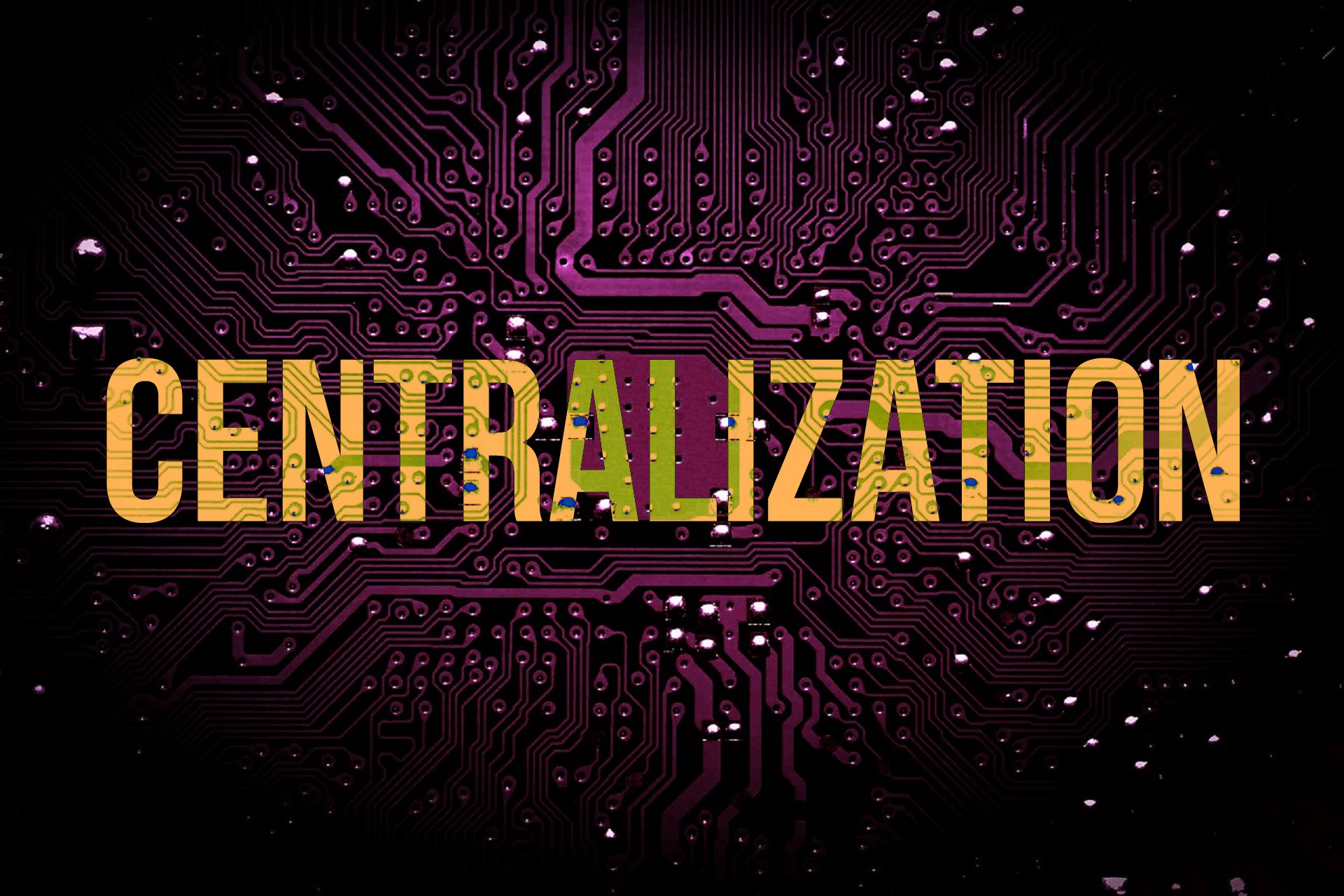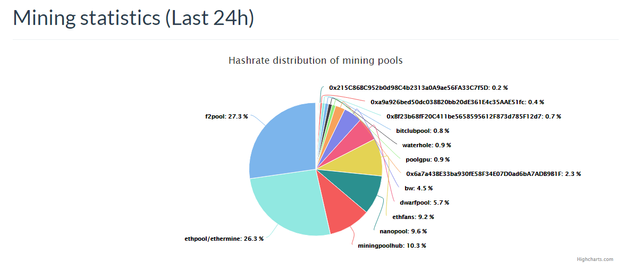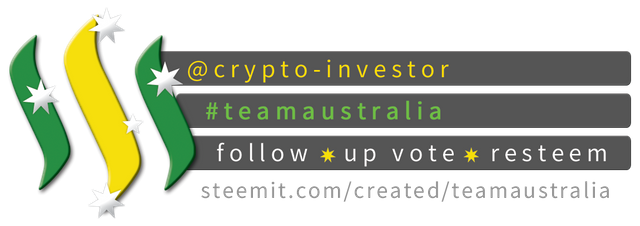Centralization of Cryptocurrency - Bitcoin, Ethereum, and EOS
This post is food for thought. A small group of individuals all met face to face in New York. This relatively small group decided the future of bitcoin which is now playing-out.
The New York Agreement and details of its constituents, the people who control bitcoin.
This is centralization, not decentralization. Now, I would say it is at least positive that these entities have an economic interest in keeping a solid protocol operational. That economic interest is really bitcoin's protection, not so much decentralization. This is not terrible, because imagine Google search permanently failing? It does not happen because of the strong economic interests within Google to keep it running.
That said, Google does funny things with your traffic, and what results it custom displays for you. Such outcomes could be in the future of digital currencies which have lost decentralization.
EOS vs. Ethereum on Decentralization
Lately, there has been a debate going on between Dan (developing EOS) and Vitalik (founder of Ethereum) about decentralization. Vitalik is being asked many questions from EOS enthusiasts and has been trying to give the CEO-like response of why his product is better. In my view, Vitalik can not really admit to the truth in any meaningful way because there are too many stakeholders on the line should he make any indications EOS might be a superior product to Ethereum. He still holds a considerable amount of ETH himself.
Dan has been patiently responding to Vitalik's criticisms of the EOS model. Some of his responses are here:
Response #1 - https://steemit.com/eos/@dan/response-to-vitalik-buterin-on-eos
Response #2 - https://steemit.com/eos/@dan/reponse-to-vitalik-s-written-remarks
At the core of Vitalik's criticism is the concept that 100 voted witnesses for the EOS blockchain, is a loss of decentralization. That effectively, if someone compromises a sufficient number of those 100 witnesses, EOS is compromised.
Dan explains correctly why this criticism is wrong. I agree with Dan's comments where he outlines the truth, bitcoin and ethereum are already centralized. The bitcoin situation above is proof enough of centralization. With bitcoin we can conclude the following:
Bitcoin Centralization
- With bitcoin, we can compromise 8 mining pools to get 75% of the hashing power under our control.
- With bitcoin, 58 companies in 22 countries decide the protocol, and not the actual user base. For example, coinbase.com has a say in the protocol, but the people who use coinbase do not have a say. Only the executive management does.
Ethereum Centralization
This same pressure to be centralized applies to Ethereum which has centralization of mining power:
5 mining pools comprise 75% of the hashing power for Ethereum. Also, the chart below shows how 15 exchanges control 95% of the transaction volume for Ethereum.
Besides initial coin offerings, I would guess that little other transaction volume occurs with Ethereum besides what we see on exchanges.
What this all means is that perhaps less than 30 entities control the Ethereum protocol and define that protocol for us. We could even take this a step further and suggest that all 30 constituents are heavily dependent upon the Ethereum Foundation for code releases and updates. Effectively, github is Ethereum's final layer of centralization.
One link controls the destiny of the Ethereum project: https://github.com/ethereum/
The github centralization constraint applies to most all cryptocurrency projects, and this fact is rarely ever talked about. People have talked about decentralization without really researching it in a pragmatic way, where a small group dictates the entire outcome of code for most all projects. The only recent exception has been bitcoin, which has enough community in-fighting that the different constituents are running their own code bases developed by different sources.
EOS Centralization
The areas of EOS centralization are as follows:
- github codebase developed by Dan and his team
- 100 witnesses, using Delegated Proof of Stake and Voting (similar to Steem's methodology)
- Finite number of exchanges which will transact most of the EOS volume initially (until market demand takes over to balance this out)
In the case of EOS then, we could say that to subvert the witness system would take at least 51% of them. I am not an expert on DPOS, so this is my guess. Total stakeholders to achieve a network-wide consensus may be then ranging from 60 to 120, depending on how we look at it.
We can conclude then Delegated Proof of Stake achieves greater decentralization than mining which permits total centralization. At least with DPOS, we have the opportunity to define the number of witnesses, and this definition of witnesses is not handled by a mindless computer algorithm, but rather by voting.
If the community learns that 20 of the witnesses are in fact 1 person pulling the strings, very likely, the community may decide not to vote for any of those witnesses. So the 100 witnesses is a robust mechanism, rather than a very weak mechanism that most computer systems achieve. Computers just make you comply by the rules, so long as you comply, they will never care what shenanigans you are performing in the background. Human voters do care, and they have the intelligence to spot people playing games to subvert the protocol.
The bad news is that the trend in cryptocurrency is centralization. The good news is that EOS using DPOS is far more decentralized than most of the cryptocurrency competitors.
Are there any Decentralized Cryptos?
I am not fully sure, because I have not researched them in detail. The following cryptos may be more decentralized than most:
- NEM (Harvesting is strange, strange enough to prevent centralization maybe!)
- IOTA (I'm skeptical with this one that if users generate their own mining, that the 51% attack is economically easy if the value of IOTA becomes too great.)
- Tezos and Decred should be looked at because they are basically advanced governance coins / systems, so it could be that in their governance models they achieve notable levels of decentralization
What you have to keep in mind, is that decentralization is an idealogy but not practically that important. It is not like the price of bitcoin needs to crash because the project is centralized. The true value here is in the borderless monetary systems, and smart contracting systems. That the borderless system is governed by a centralized international group of market stake-holders does not personally bother me too much.
That said, I prefer voting models like Tezos aims for, and that DPOS also produces, where the users of the crypto vote on how the system aught to operate.




Hello Crypto - I see above that you really know your stuff when it comes to EOS and ETH- thanks for writing this in a way even a novice like me can understand- I want to thank you for showing support for my music project - one thing i wanted to ask is -- is it ok if i name you as a sponsor next week when i use your donation to fund the competition? You may prefer to stay in the background, so i am letting you decide before i use your name. All the best and have a great week, i hope you profit from the coming split too. David
Yeah go for it. I like having Steemit competitions, but it's a bit of work to run them. I'm glad you are doing one.
thanks mate
If you think about about the lifecycle of crypto, centralization is actually a feature. You must have centralization at the onset in order to develop the code and produce the product (e.g., token). Then, in an effort to decentralize the centrally produced code, it's offered to the public with incentives to run the code and receive rewards for doing so (e.g., mining). Then, like what you're saying, the economies of scale become a reality and a consolidation occurs with a few players.
Even though I am ideologically libertarian and recognize the ideal of decentralization, this inevitable fact remains that centralization in various forms is necessary for organized success of a project. Dan seems to be correct that the better question to ask is how decentralized a system is relative to other competitors. And he makes the case very well, that DPOS is a better alternative than things like mining pools.
Re: valuation of EOS; it is difficult to say what the value will come out to be. Dan is focused on distributing the tokens fairly uniformly. This is intended purposely so that EOS won't be unreachable to folks to use the token, and to that end it would seem that the token won't sky rocket to the moon based on the supply and expected inflation. My best guess is EOS trades around $20/token in about 5 years time assuming it reaches ETH's current market cap levels of ~$20bil. This also does not account for inflation of the USD, which could cause that price to rise considerably.
One other thing, the EOS valuation could rise further should the EOS platform allow tokens to be launched on the OS. I say this because I see 2 primary reasons to own ETH: (1) to run an app and (2) launch a token. We know that you will need (1) for EOS so the demand for the token will be there. But demand will likely increase should you be able to do (2). I think a lot of the ETH price surge we're seeing is because of (2).
Yes, I never mentioned it but I expect many ICO's to switch to EOS. At the end of the day, ETH could hang onto the ICO market if they fix their gas pricing issues during hot ICO's, and they ramp up transactions per second. Last I heard Vitalik wants to scale ETH by doing lightning network stuff and sharding, what that means is the important stuff happens off blockchain.
When EOS hits in a year and just does everything on blockchain without hiding it off in black boxes between sophisticated parties, it will just be favored by innovators.
If we have to shard ETH and do a LN transaction between two third parties off the blockchain... then those two third parties don't even need ETH to begin with. They could just build their own 3rd party encrypted verified system using anything else at all. They could smart contract off of BTC if they wanted to and do LN transactions on that. LN is sort of an excuse where they decided "We can't scale."
Although I love the idea of a decentralized monetary system, if I look at the situation pragmatically, it's only a matter of time before any currency which attains any serious level of wide reaching acceptance becomes centralized. He who owns the gold make the rules, and make no mistake about it, the governments own the gold.
I agree that some common ground can be found and that centralization makes a lot of sense on many fronts, but any system that's adopted without actual human voting has no chance of not becoming the corrupt and totally manipulated clown show that we deal with in the financial markets today. The smaller the market is, the easier it can be manipulated. Centralization brings with it the type of money needed to maintain some level of free market functionality. Main stream acceptance and the flooding of new money into the space from people all over the world would give us some level of freedom in the crypto market. That is my hope for crypto. To allow humanity to have as much monetary freedom as possible for as long as possible. I know in my heart, eventually, the big money will control this space like it does everything else, but if we can maintain the peer to peer functionality without the debilitating fees we face today, it will be a huge win for us all.
Thanks for a very thought provoking post @crypto-investor
I like the way you've highlighted the need for everyone to "take a step back" every so often to realise issues as you've raised here.
Thank you
Thank you for the fine research... one thing to keep in mind also is that EOS is doing their ICO with Ether, by the end one the year-ico they will own a lot of ether, I mean a buuuunch. They could use that ether as a weapon against ether ... that would be very centralized warfare
In time we will all be asking ourselves " What is decentralisation?" Even if we decentralise these decentralise "powers" will be corrupted one way or another. Give anyone a little bit of power and it will go to their heads. Decentralisation is just the spreading of power from one big despot to many smaller despot. That's just human nature.
Bitcoin is not centralized because someone else can create more then 50% of the hashing power that exists and control over half the network. You can't do that with a centralized organization.
Thanks - this explanation is the most useful I've seen
How much u suggest eos should we hold for becoming millionaires, and how much u have or planning to hold
I think EOS will still drop. I already own some. Should EOS be the wildly successful use case, we can see a market cap of 100 billion, assuming hundreds of app developers begin launching their projects on it. This would be something like $100 USD per EOS... best case of course, and this would take time, probably 3-5 years after launch. If EOS gets caught up as the spearhead into the blockchain revolution of the internet, it could go higher. At a certain size we might wonder if pressures are going to affect EOS after it has left other coins in the dust. Very likely to be copy cats and competitors then. So the best case, if you hold 10,000 EOS, you could get 1 million dollars. That said, I could see it trading below $1 before June 2018. ... I own about 2,100 EOS at the moment. Waiting for market pull backs and I would be buying more then.
You forget Pivx ! they working on fair voting